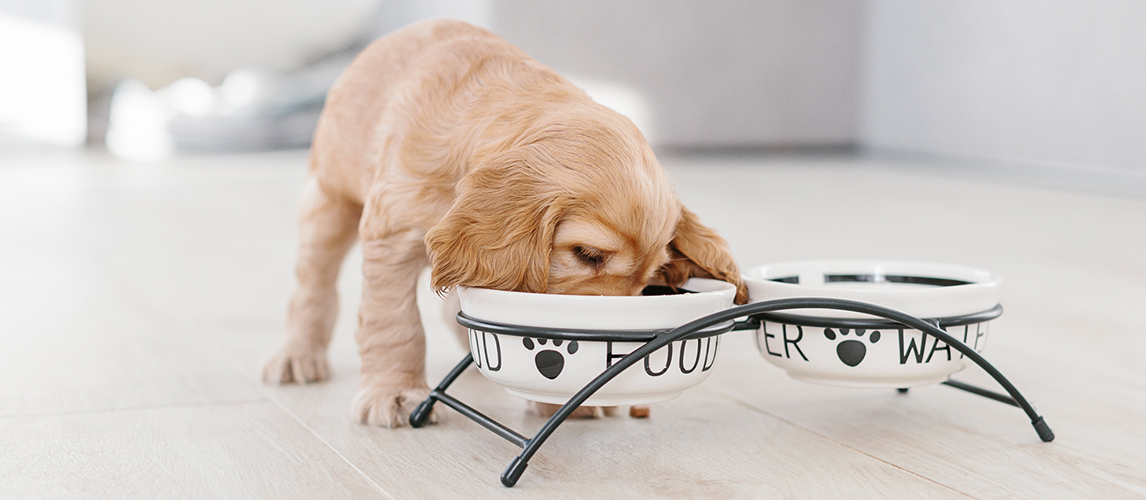Sometimes, a mother dog is not able, present or even willing to nurse her puppies. But that doesn’t mean the little furballs cannot grow up to be strong and healthy. It does, however, mean that these pups need extra care and attention to develop strong immune systems and healthy bones. That’s where puppy milk replaces come in – these special puppy formulas are very similar to baby formulas for humans, meaning they contain all the necessary nutrients, vitamins and minerals to help tiny pups grow big and healthy.
To help you find the best milk for your puppy, we’ve tested and reviewed dozens of puppy milk formulas. What we came up with is a list of five best puppy milk replacers on the market at the moment. Read on to find the right product for your four-legged baby.
The Best Puppy Milk Replacer
1 PetAg Esbilac Puppy Milk Replacer
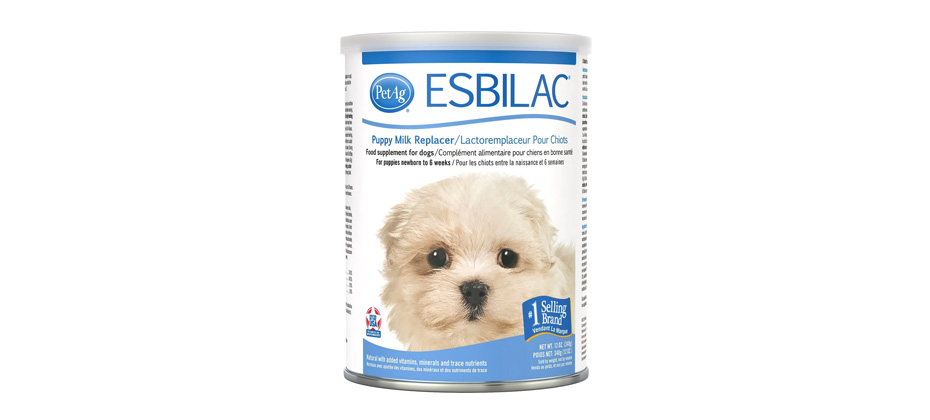
- Kilocalories: 900 kcal per kg
- Minimum protein: 33%
- Minimum fat: 40%
- Maximum fiber: 0%
- Maximum moisture: 5%
- With probiotics and prebiotics
- Enriched with vitamins and minerals
- First five ingredients: vegetable oil, casein, dried whey protein concentrate, dried cream, dried skimmed milk
The PetAg Esbilac is one of the most popular puppy milk formulas on the market currently. Here is why – an all natural milk replacer without any preservatives, with a bunch of beneficial prebiotics and probiotics, essential vitamins and minerals, this formula is easily digestible and highly palatable. The puppies not only thrive on this formula, but they enjoy eating it.
Made for newborn puppies and up to 6 weeks of age, this milk replacer provides all the necessary nutrients and mimics the mother dog’s milk in both protein, fat, carbohydrates and energy. The PetAg Esbilac can also be used for supplemental feeding for dogs that are skinny and stressed (e.g. after surgery) and require a source of highly digestible nutrients. Elder dogs that prefer wet foods can also consume it.

2 Petlac Milk Powder For Puppies
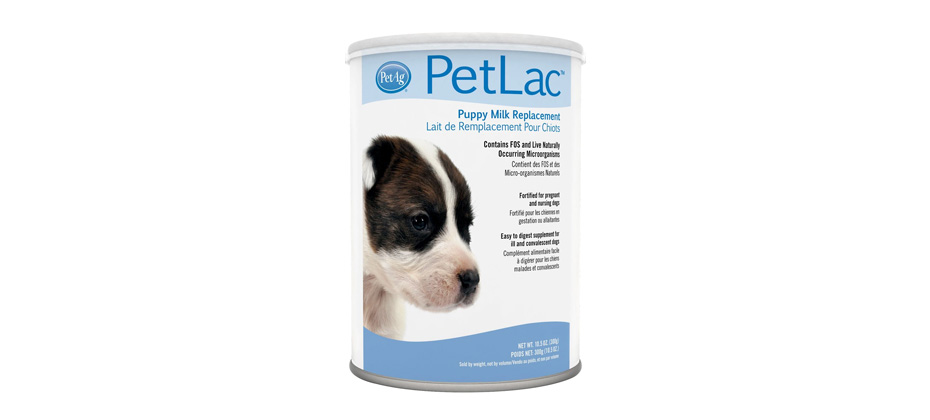
- Kilocalories: 858 kcal per kg
- Minimum protein: 29%
- Minimum fat: 28%
- Maximum fiber: 0.5%
- Maximum moisture: 5%
- With probiotics and prebiotics
- Fortified with vitamins and minerals
- First five ingredients: vegetable oil, dried skim milk, soy protein isolate, casein, dicalcium phosphate
An excellent food source for newborn puppies, or older but thin animals in need of easily digestible nutrients, the PetLac Milk Powder is rich in naturally occurring microorganisms (probiotics and prebiotics) and enriched with different vitamins and minerals. The formula is very palatable and provides canines with necessary nutrients for proper development.
The PetLac milk replacer is designed for orphaned or rejected newborn puppies, to six weeks old pups. However, it can also serve as a good food source for elder and sick dogs who need supplement foods or simply prefer wet foods. This also makes for a great transition food if you’re looking to wean puppies from their mother.

3 PetAg Goat’s Milk Replacer For Puppies
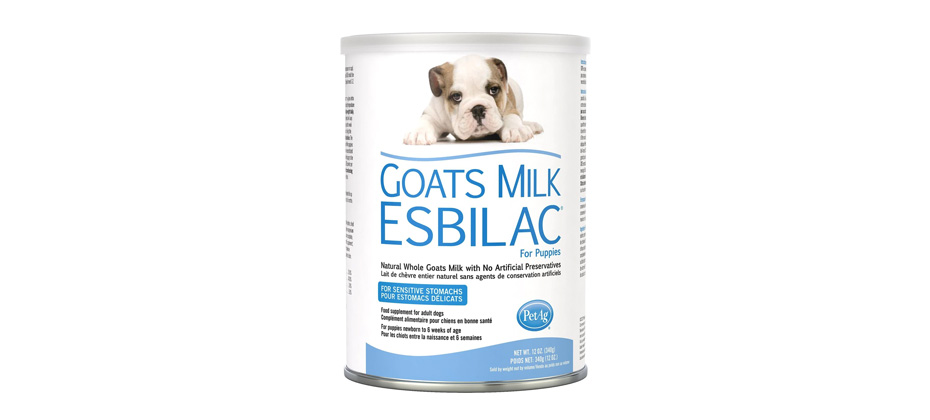
- Kilocalories: 900 kcal per kg
- Minimum protein: 33%
- Minimum fat: 40%
- Maximum fiber: 0%
- Maximum moisture: 5%
- Made with real goat milk
- Enriched with vitamins and minerals
- First five ingredients: dried whole goat milk powder, casein, soybean oil, dried goat milk protein, dried whey protein concentrate
One of the best-quality milk replacers for puppies, the PetAg Goat’s Milk Esbilac Powder is an all natural, free from preservatives, made with real goat milk formula that is guaranteed to make newborn pups grow and thrive. Delicious in dog-terms and easy to digest, this puppy formula mimics the mother dog’s milk in terms of protein, fat, carbohydrates and other essential nutrients.
The Goat’s Milk Esbilac Powder is also enriched with different vitamins and minerals, so it makes for a complete puppy meal. And if you don’t have a puppy, but an older dog in need for some highly digestible nutrients? This milk powder has got you covered – it’s ideal for canines in need of supplemental feeding, so older and elderly dogs can use it too.

4 Sav A Caf Puppy Milk Replacer
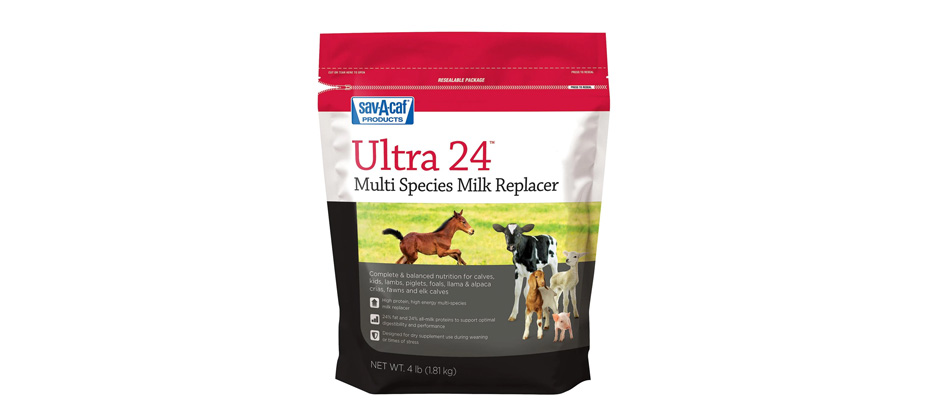
- Minimum protein: 24%
- Minimum fat: 24%
- Maximum fiber: 0.15%
- Enriched with vitamins and minerals
- First five ingredients: dried whey, dried whey protein concentrate, dried whey product, dried skimmed milk, animal fat
Complete and balanced nutrition for newborn animals at an affordable price? Yes, the Ultra 24 Multi-Purpose Milk Replacer is not only a life-saver for little puppies, but kittens, lambs, piglets, foals, calves, fawns, llama and alpaca crias, elk calves and goat kids. Talk about multi-purpose!
Like real dog milk, this milk formula contains a balanced amount of protein, fat and carbohydrates, so it provides a nourishing meal for newborn and growing puppies. It’s also fortified with various vitamins and minerals, including vitamins D3 and A, calcium, copper, zinc. The powder can also be used as a supplemental food for dogs who have undergone recent surgery, are stressed or are simply too thin.

5 Nutri-Vet Puppy Milk Replacer
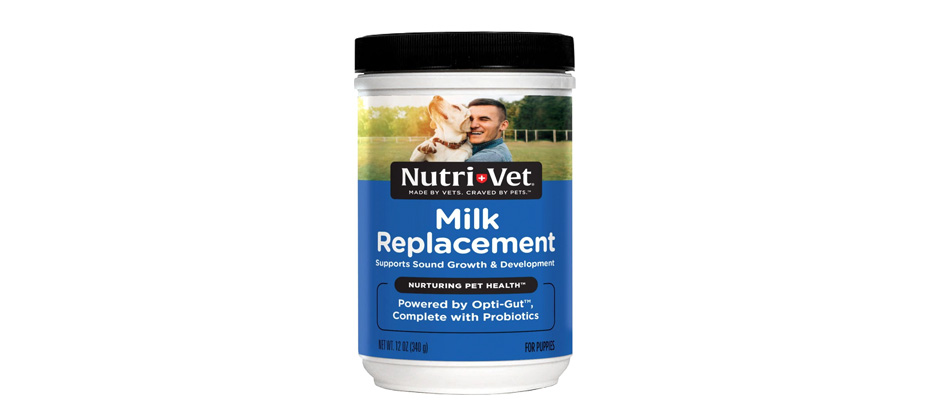
- Kilocalories: 6000 kcal per kg
- Minimum protein: 33%
- Minimum fat: 40%
- Maximum fiber: 0.2%
- Maximum moisture: 5%
- With protein antibody molecules and electrolytes
- Enriched with vitamins and minerals
- First five ingredients: animal and vegetable fat, dried whey protein concentrate, dried whey, sodium casein, dicalcium phosphate
If you’re looking for a truly effective puppy milk replacer, one that has been formulated by veterinarians, then try the Nutri-Vet Milk Replacement for Puppies. This formula contains everything a newborn or a growing puppy needs: a balanced ratio of protein, fat and carbohydrates, plus various vitamins, minerals and amino acids.
The Nutri-Vet’s puppy milk formula mimics colostrum, meaning besides essential nutrients, it contains large protein antibody molecules, electrolytes and other important nutrients. It’s also very high in calories, so it’s an excellent addition for dogs under stress or pets who are too thin and need to gain weight in order to get stronger. Furthemore, it can be used to help meet increased nutritional requirements during dog’s pregnancy.

Best Puppy Milk Replacers: Buying Guide & FAQ
To help your puppy grow strong and healthy, it’s crucial to pick the right milk replacer. But what makes the best puppy milk formula? For starters, a good milk replacer contains almost identical nutrients as the real mother’s milk, meaning a balanced ratio of protein, fat and carbohydrates. It also needs to be easy to digest, and of course, highly palatable so the pups are actually willing to eat it. Next, it’s necessary that the formula is fortified with certain vitamins and minerals, so the canine babies get the right nutrients needed for proper development. It’s also a plus if a formula is calorie-dense.
This may seem like a lot of requirements, but we’re actually just scratching the surface here. To find the best milk replacer for puppies, we need to dig a little deeper and get into the details, which is what we’ll do in the following chapters. Read about the differences between liquid and powder replacers, ingredients you should look for when buying a puppy milk formula, and whether your pup actually needs it. Also check out our FAQ section to get all the answers necessary to purchase the best puppy milk replacer for your tiny furbaby.
Reasons You May Need Milk Replacers for Puppies

First things first – does your puppy even need a milk replacer? Ideally, newborns should always first be nursed by their dog mothers for two reasons:
- Mother’s milk provides nutrients no milk formula can fully mimic
- It contains unique antibodies that help the puppy develop a strong immune system.
Still, if a puppy cannot be nursed by its mother for whatever reasons, it’s not the end of the world. As long as he or she gets the right milk replacer often and regularly, it can grow into a strong and healthy canine.
So clearly, if a puppy is being nursed by its mother, there’s no need for a milk formula, right? Not exactly – if a mother doesn’t appear to have enough milk, or the puppy simply isn’t eating enough, it’s wise to include a milk replacer to ensure the tiny dog gets enough calories and necessary nutrients. And of course, if you have a puppy that doesn’t have a mother, or the mother is unable/unwilling to nurse, you most definitely need a puppy milk formula. Another way to use a milk replacer is as a supplement – if you have an adult dog who has recently been under stress, is recovering from an illness or is simply old and cannot eat many solid foods, a milk formula may help him get back on his feet.
To sum it up, you may want to use a milk replacer if:
- Your newborn or growing puppy doesn’t have a mother or the mother is unable/unwilling to nurse
- Your puppy doesn’t seem to eat enough
- You want to supplement your pregnant dog
- Your adult/elder dog doesn’t eat enough or cannot eat many solid foods
Take a look at our guide on Supplements for Pregnant Dogs.
Differences Between Powder and Liquid Formulas
Both liquid and powder puppy milk formulas have one goal: to help your newborn puppy live without its mother’s milk and grow into a healthy dog. The way these formulas are able to do that is by giving your puppy what it needs – important nutrients, such as fat and protein, carbohydrates and of course, vitamins and minerals. Essentially, the only difference between powder and liquid formulas is in their long-term storage.
Powder Formulas
Because they don’t contain any significant amount of moisture, powder formulas last longer – much longer than liquid formulas, in fact. Moisture allows bacteria to grow more quickly, so powder formulas are a great option if you’re looking to use the replacer for longer periods of time. This also saves money, as you don’t have to buy powder formulas as frequently as liquids.
The only downside of powder formulas is that, unlike liquids, they cannot be served immediately. These milk replacers need to be mixed with water before they can be served, and although most formulas are easy to prepare if you stick to the directions on the label, some may require a little bit of experimentation to find the formulation your pet likes the most.
Liquid Formulas
Liquid milk replacers are exactly what they sound like – milk replacers in the form of liquid, just like real milk. They’re easy to use, as all you have to do is open the product and serve it. However, because they contain water, they’re also highly prone to spoilage. For this reason, when buying a liquid formula, it’s crucial to use it up quickly, or you’ll end up feeding your puppy spoiled milk, which can cause a host of problems (diarrhea and serious digestive issues, among many).
Ingredients to Look For in Puppy Milk Replacers Formulas

To get your puppy the best milk formula, you need to know what ingredients to look for. So let’s get into the specifics, shall we?
First, make sure you understand why your tiny furball needs special kind of nutrients and the right balance of them: during a newborn’s first days and weeks of life, his body tries to grow and develop as much as possible. Therefore, he needs lots of calories, a balanced amount of protein, fat and carbohydrates, and some vitamins and minerals so his musculoskeletal and immune system can develop properly.
What to Look For
Calorie-Dense Formulas
Because the newborn puppy’s body is trying to grow and develop fast, it’s important you feed her calorie-dense milk formulas. Milk replacers high in calories will make sure the pup gets all the energy she needs and will keep her satiated and happy.
The Right Balance of Nutrients
A good puppy milk replacer will have a balanced amount of nutrients, meaning around:
- 30% of proteins
- 40% of quality fats
- Added vitamins and minerals.
In general, the more protein, the better, but that doesn’t mean the formula should contain only the protein – fat from it. Between 25% to 35% of protein and 25% to 40% of fat is considered to be very good, but some puppies will prefer more fatty formulas, while others will prefer more watery formulas.
As for micronutrients, it’s crucial that the milk replacers contain a wide array of them. The real mother’s milk contains everything a growing pup needs, including all the right vitamins and minerals. Therefore, for a milk formula to be as successful as the real deal in promoting growth and health, it needs to be enriched with certain micronutrients.
- Low levels of vitamin A help the puppy grow strong muscles and nerves, develop good vision, healthy skin and shiny coat.
- Vitamin B12ensures the pup’s nervous system functions properly, he metabolizes proteins and carbs efficiently, develops a healthy heart, has energy and appetite.
- Vitamin E helps muscle development, acts as an antioxidant that protects cell membranes and helps the pup develop a strong immune system.
- Low levels of vitamin D3 help puppy develop a strong heart muscle and keeps her immune system strong.
- Minerals such as calcium, zinc, iron, phosphorus, iodine and others, as well as amino acids and essential fatty acids also play important roles in proper muscle, nerve and tissue development.
- Real ingredients – Puppy milk replacers should contain real ingredients, and as little as possible artificial preservatives, colorings, etc. So look for things such as:
- Dried whey
- Dried whole milk
- Skimmed milk
- Egg products
- Animals and/or vegetable fat
What to Avoid
Artificial Fillers
Normally, most foods, no matter if they’re intended for humans or for canines, contain some types of preservatives. But in the case of newborn puppies, it’s best to avoid too many artificial preservatives and other fillers, including flavors, colorings and other additives, simply because their digestive system is still very sensitive and their immune function is not yet fully developed. Still, some natural preservatives are fine.
While we’re at it, also avoid products containing too much sugar and salt. These may add to the palatability to the formula, but bring little nourishment to the developing puppies.
Source:
Frequently Asked Questions
Being a newborn puppy is hard – your body needs all the right nutrients in order to grow and develop and you need lots of love and attention to be happy. Luckily, it’s easy to take care of the latter, but what about the former?
As mentioned, puppies require special nutrition:
- A balanced ratio of protein, fat and carbohydrates
- Vitamins, minerals, amino acids and essential fatty acids
- Calorie-dense foods
Basically, you want to purchase a puppy milk replacer that checks all the right boxes. Fortunately, we can help with that, as all five reviewed milk formulas in this article satisfy the above-mentioned requirements.
Puppy milk formulas are made to be safe for newborn puppies all the way to 6 or 8 weeks of age. The reason why you can usually see that number advertised on the box is because at that age, puppies should be slowly weaned off of milk and moved to moist or even solid foods.
However, that doesn’t mean that older puppies, adult and even elder dogs cannot consume puppy milk formulas. In fact, it’s even recommended for certain adult dogs – pregnant and nursing canines included. The milk replacers are essentially calorie-dense foods, packed with essential vitamins and trace minerals, so they’re perfectly safe for adult dogs.
So, if you have:
- A stressed dog who needs highly digestible food in order to recover
- An elder dog who prefers wet foods
- A pregnant or a nursing dog
- A thin dog in need of calorie-dense food
Feel free to give them puppy milk replacers.
One of the most commonly asked questions by new puppy owners is if it’s safe to give the little ones regular cow’s milk. The answer is a simple No.
Every species has milk specifically tailored to the needs of their growing young animals. Thus, cow milk contains exactly what a newborn calf needs, not a dog. Add to that the fact that newborn puppies have very sensitive stomachs, not yet fully developed immunities, and you get the picture – cow milk is not safe for puppies.
You may also like our ultimate guide on Dog Food for Sensitive Stomachs.
To get into more details, let’s talk about the differences in the basic compositions of cow milk and dog milk.
- Cow milk
Cow milk contains much more lactose, less fat and less protein than dog’s milk. Furthermore, it’s lower in calories than dog’s milk, but it has more sugar. It also lacks the appropriate ratio of amino acids and essential fatty acids necessary for growing puppies.
If you want less theory and more practice, real-life examples have shown that puppies develop serious digestive issues like diarrhea, painful abdomen and bloating when given cow milk. Furthermore, cow milk can cause serious sinus issues in pups.
- Dog milk
Dog milk contains less lactose, more protein and more fat than cow milk. It’s also much higher in calories, making it a calorie-dense food that puppies thrive on. As for amino acids and essential fatty acids, dog milk has the right ratio and right amount, although this depends on the brand of the milk replacer used.
If cow milk is not appropriate for newborn puppies, you may be wondering why some puppy milk formulas contain dehydrated/powdered forms of cow and goat milk?
Dehydrated versions contain filtered milk with no water so it’s much easier to digest it than regular cow milk. Additionally, puppy milk formulas contain supplemental ingredients, including vitamins, minerals, amino acids and essential fatty acids, and sometimes probiotics and prebiotics, making them almost as good as the real dog milk.
To give your puppy a milk replacer, you’ll need:
- A feeding bottle, or
- A feeding syringe.
Most people prefer the bottles because they are more convenient for the owner and the puppy itself. However, experimentation may be necessary to find the best way to feed your tiny dog – some prefer the bottles, others syringes, so don’t be afraid to try different things if one doesn’t seem to work.
- Feeding bottles
Feeding bottles come in different sizes and shapes, but all come with soft nipples that allow puppies to drink their milk easily – much like they would from their mother.
The bottles are pretty easy and convenient to use. All you have to do is prepare the milk formula, pour it in the bottle, and offer it to your pet. The little pup will do the work all by himself.
- Feeding syringes
Syringes too come in many sizes, but it’s always best to purchase the smaller ones so you can closely follow how much the pup is drinking (you never want to over-feed the puppy).
They’re also easy to use, although it’s you who will do much of the work here – the more you advance the plunger of a syringe, the more milk will go out, so be careful not to squirt too much of it at once.
Generally speaking, both feeding bottles and syringes do a good job of feeding the puppies, so we couldn’t say that one is better than the other – this depends on your and your puppy’s needs and preferences.
So you’ve purchased the puppy milk replacer, as well as a nice feeding bottle and all that’s left now is to actually feed the puppy. How to go about that? Let’s break it down into simple steps:
- Put a hole in the feeding bottle’s nipple: take a small needle, sterilize it with a flame and put two small holes in the point of the nipple. Make sure the holes are not large as this can lead to feeding issues, such as milk ending up in puppy’s lungs.
- Prepare the milk formula: always follow the directions on the label of the product. Mix the formula with water and blend it really well so there are no clumps. Sometimes, mixing the formula with water will require a bit of experimentation – although you should always follow the instructions first, it’s fine to modify the formula a little if your pup doesn’t seem to take it well. If he becomes constipated, use more water than directed, if he starts getting soft stools, add less.
- Heat up the formula: before giving the milk replacer to puppy, you need to make sure the milk is at the right temperature. Newborns cannot adequately regulate their body temperature, so cold milk could make them chill and even cause hypothermia. So place the bottle in a bowl of hot water and leave it for a while – it shouldn’t be too hot or too cold (around 99 Fahrenheit or 37 Celsius is ideal).
- Feed your puppy the right amount of formula: finally, give the bottle to your puppy and feed her the right amount. Most puppies like to eat a bit too much, but it’s important not to overfeed them, as this can lead to digestive issues and other health problems. The best way to feed a puppy is to give her small amounts of milk throughout the day – every two to three hours.


